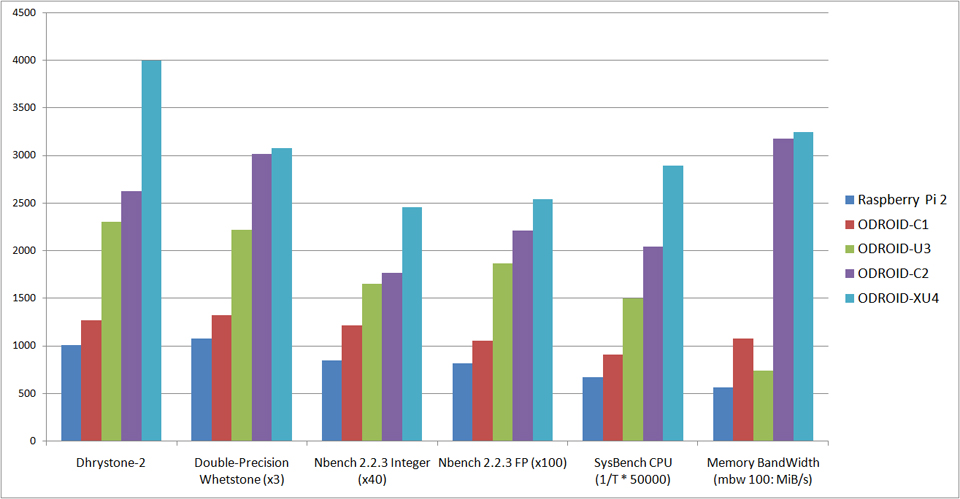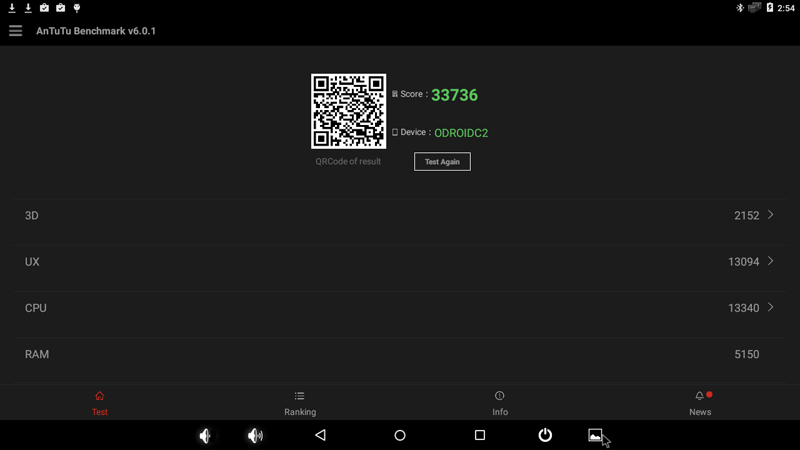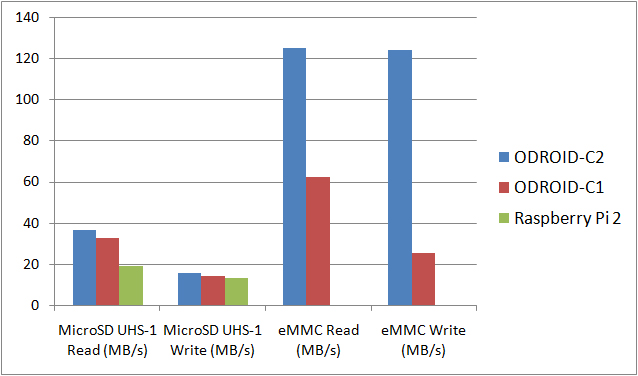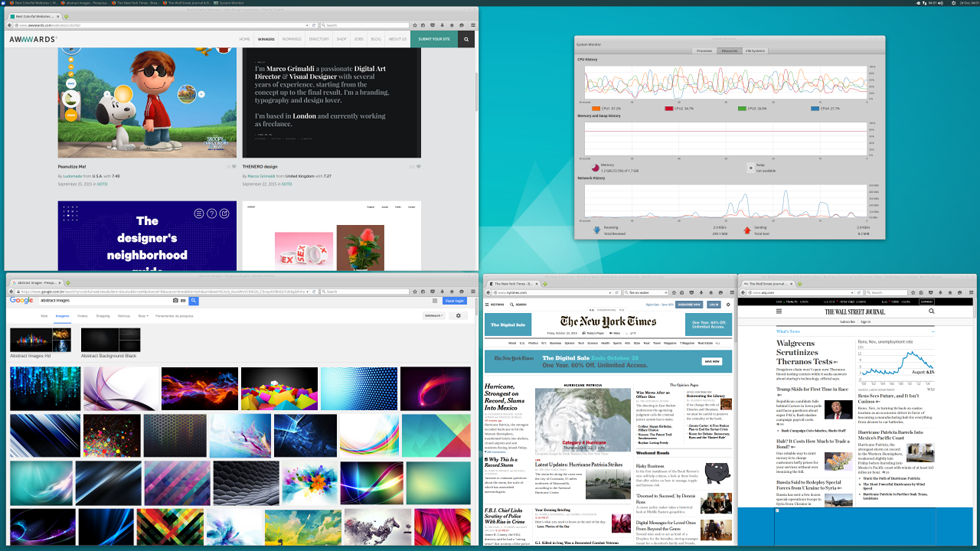* Amlogic ARM® Cortex®-A53(ARMv8) 1.5Ghz quad core CPUs
* Mali™-450 GPU (3 Pixel-processors + 2 Vertex shader processors)
* 2Gbyte DDR3 SDRAM
* Gigabit Ethernet
* HDMI 2.0 4K/60Hz display
* H.265 4K/60FPS and H.264 4K/30FPS capable VPU
* 40pin GPIOs + 7pin I2S
* eMMC5.0 HS400 Flash Storage slot / UHS-1 SDR50 MicroSD Card slot
* USB 2.0 Host x 4, USB OTG x 1 (power + data capable)
* Infrared(IR) Receiver
* Ubuntu 16.04 or Android 5.1 Lollipop based on Kernel 3.14LTS
STORE in Local : check it HERE
Next shipment will be restarted from middle of March.
http://forum.odroid.com/viewtopic.php?f=29&t=25811
The price is increased from end of February 2017
|

(Click enlarge the image)
|
|
OS Image files and BSP source code are available in our WiKi : http://odroid.com/dokuwiki/doku.php?id=en:odroid-c2
* An additional MicroSD card or an eMMC module is required to install the OS.
We recommend the eMMC module as it has much higher performance than standard MicroSD cards.
* Remove the Jumper on J1, if you don't use the USB OTG port as a power input.
It will reduce the power consumption and heat significantly.
* ARM 64bit is a very new platform and some system specific Linux softwares are not working stably at this moment.
So there might be the compatibility issues frequently and we may need longer time to fix the issues.
|
|
STORY ABOUT THE ODROID-C2
Here is the comparisons to give you better understanding of ODROID-C2.
ODROID-C2 vs ODROID-C1 vs Raspberry Pi2
Both are Linux-friendly ARM® single-board computers for various applications and purposes.
Hardware Comparison
The ODROID-C2 has many advantages over the Raspberry Pi2.
The processor is an S905 1.5GHz Quad-core from Amlogic with 2GByte DDR3 RAM, Gigabit-Ethernet and IR-receiver. The size of this computer is still only 85 x 56 mm with a weight of 40g, and offers silent operation, 2~5W average power usage, and instant portability, since it fits in a shirt pocket.
One powerful feature of the ODROID-C2 is an SD 3.01 standard compatible UHS-1 MicroSD card, as well as the faster eMMC module, can be ordered with the ODROID-C2, and arrives with the popular Ubuntu operating system already installed. Insert the MicroSD card into the slot, connect a monitor, a keyboard, a mouse, Ethernet and power cable, and that’s all you need to do to use the ODROID-C2! Browse the web, play games, run office programs, edit photos, develop software, and watch videos right away.
The ODROID-C2 also has a 40+7pin GPIO header to make a physical interface between the board and the outside world. The 40+7pin interface headers include PWM, I2C, I2S, UART, ADC and GPIO function.
The IR receiver and ADC features on the ODROID-C2 offer many options for building great DIY projects.
|
|
ODROID-C2 |
ODROID-C1+ |
RPi 2 Model B |
|
CPU |
Amlogic S905 SoC
4 x ARM Cortex-A53 1.5GHz
64bit ARMv8 Architecture @28nm
|
Amlogic S805 SoC
4 x ARM Cortex-A5 1.5GHz
32bit ARMv7 Architecture @28nm
|
Broadcom BCM2836
4 x ARM Cortex-A7 900MHz
32bit ARMv7 Architecture @40nm
|
|
GPU |
3 x ARM Mali-450 MP 700MHz |
2 x ARM Mali-450 MP 600MHz |
1 x VideoCore IV 250MHz |
|
RAM |
2GB 32bit DDR3 912MHz |
1GB 32bit DDR3 792MHz |
1GB 32bit LP-DDR2 400MHz |
|
Flash Storage |
Micro-SD UHS-1 @83Mhz/SDR50 or
eMMC5.0 storage option |
Micro-SD UHS-1 @78Mhz/SDR50 or
eMMC4.5 storage option |
Micro-SD @ 50Mhz/SDR25
No eMMC storage option |
|
USB2.0 Host |
4 Ports |
4 Ports |
4Ports |
|
USB2.0 Device /
OTG
|
1 Port for Linux USB Gadget device or
USB host |
1 Port for Linux USB Gadget device or
USB host |
No |
|
Ethernet / LAN |
10 / 100 / 1000 Mbit/s |
10 / 100 / 1000 Mbit/s |
10 / 100 Mbit/s |
|
Video Output |
HDMI 2.0 4K / 60Hz |
HDMI 1.4 |
HDMI 1.4 / RCA / DSI |
|
Audio Output |
HDMI / I2S |
HDMI / I2S |
MDMI / 3.5mm Jack / I2S |
|
Camera Input |
USB 720p |
USB 720p |
MIPI CSI 1080p |
|
Real Time Clock |
No (unless using an add-on module) |
Yes (on-board RTC) |
No (unless using an add-on module) |
|
IR Receiver |
Yes (on-board IR sensor) |
Yes ( on-board IR sensor) |
No (unless using an add-on module) |
|
IO Expansion |
40 + 7 pin port
GPIO / UART / I2C / I2S / ADC |
40 + 7 pin port
GPIO / UART / SPI / I2C / I2S / ADC |
40 pin port
GPIO / UART / SPI / I2S |
|
ADC |
10bit SAR 2 channels |
10bit SAR 2 channels |
No (unless using an add-on board) |
|
Heat sink |
Included |
Included |
Optional |
|
Size |
85 x 56 mm (3.35 x 2.2 inch) |
85 x 56 mm (3.35 x 2.2 inch) |
85 x 56 mm (3.35 x 2.2 inch) |
|
Weight |
40g (1.41oz) |
40g (1.41oz) |
42g (1.48oz) |
|
Price |
$40 |
$37 |
$35 |
|
CPU and RAM performance comparison
We ran several different benchmarks to measure the computing power on the ODROID-C2. The same tests were performed on the Raspberry Pi 2, ODROID-C1, ODROID-U3 and ODROID-XU4 for easier comparison.
The values of the test results were scaled uniformly for comparison purposes. The computing power of the C2 was measured to be ~2-3 times faster than the latest Raspberry Pi 2 thanks to the 1.5Ghz Cortex-A53 cores and much higher memory bandwidth. The high-performance 2GB DDR3 RAM is an additional advantage allowing most programs to run smoothly on the C2. The best performance that we can archive is the below.
|
 |
|
|
Benchmarks (Index Score) |
Raspberry Pi 2 |
ODROID-C1 |
ODROID-U3 |
ODROID-C2 |
ODROID-XU4 |
|
Dhrystone-2 |
1006.6 |
1262.8 |
2300.7 |
2623.9 |
3994.1 |
|
Double-Precision Whetstone (x3) |
1076.1 |
1318.8 |
2217.9 |
3015.6 |
3074.7 |
|
Nbench 2.2.3 Integer (x40) |
840.0 |
1208.0 |
1648.0 |
1764.0 |
2451.1 |
|
Nbench 2.2.3 FP (x100) |
809.0 |
1050.0 |
1860.0 |
2210.1 |
2536.9 |
|
SysBench CPU (1/T * 50000) |
6669.3 |
902.2 |
1497.0 |
2040.8 |
2891.8 |
|
Memory BandWidth (mbw 100 : MiB/s) |
557.1 |
1069.6 |
736.6 |
3171.6 |
3243.8 |
|
Antutu Scores on Android5.1 Lollipop

ODROID-C2 shows around 33,700pts while ODROID-C1+ shows around 21,200pts. So you can run Android OS more smoothly. Note that the XU4 shows around 51,000pts thanks to the much faster A15 cores and Mali-T628 MP6 GPU cores. But the ODROID-C2 has higher rate of the “Performance per Dollar” probably.
|
Storage I/O comparison
The C2 can boot from a MicroSD card or an eMMC module. The MicroSD interface supports the higher performance UHS-1 mode as well. File access of a 512MB file (read/write) on two different storage options shows distinct performance differences. The eMMC 5.0 storage is ~7x faster than the MicroSD Class-10 card in read tests. The MicroSD UHS-1 card is ~2x faster than the MicroSD Class-10 card in read tests. The MicroSD UHS-1 card provides a great low-cost option for many applications!
To obtain the results in the storage I/O comparison graph, type the following lines at a command prompt.
Write speed command :
$ dd if=/dev/zero of=test.tmp oflag=direct bs=8M count=64
Read speed command :
$ dd if=test.tmp of=/dev/null iflag=direct bs=8M count=64
|
 |
|
|
ODROID-C2 |
ODROID-C1 |
Raspberry Pi2 |
|
MicroSD UHS-1 Read(MB/s) |
36.7 |
32.5 |
19.2 |
|
MicroSD UHS-1 Write(MB/s) |
15.5 |
14.2 |
13.2 |
|
eMMC Read(MB/s) |
125.0 |
62.2 |
NA |
|
eMMC Write(MB/s) |
124.0 |
25.2 |
NA |
|
|
|
|
|
Ethernet Performance Comparison
The ODRID-C2 has an on-board Gigabit Ethernet controller. Our bi-directional streaming speed was measured at ~900Mbps.
Thanks to the doubled Tx buffer in S905, the upload speed is twice faster than C1.
|
|
ODROID-C2 |
ODROID-C1 |
Raspberry Pi2 |
iperf Server on SBC
(Mbit/sec) |
935.0 |
9280 |
98.6 |
iperf Server on PC
(Mbit/sec) |
928.0 |
392.0 |
66.5 |
Test condition
Server mode : iperf -s
Client Mode : iperf -c [ip address] -P 10 -W 32k
|
 |
|
The 4K HDMI output shows gorgeous desktop screen on 3840 x 2160 UHD resolution.
But the rendering speed is not good due to the limited performance.
4K video playback on the Android OS is quite stable and fast for 4K/HEVC playback on a real 4K display.

|
|
SPECIFICATIONS
|
Processor |
Amlogic S905 SoC ARM® Cortex®-A53 (ARMv8) 1.5GHz Quad Core ARMv8 architecture @28nm wafer |
|
Memory |
2Gbyte DDR3 SDRAM |
|
3D Accelerator |
ARM® Mali™-450 OpenGL ES 2.0 / 1.1 (3 x Pixel processors and 2 x Vertex shader processors) |
|
Flash Storage |
eMMC 5.0 Module Socket : 8~64GB eMMC module (option)
MicroSD Card Slot : 8 ~128GB MicroSD UHS-1 (option) |
|
USB2.0 Host |
High speed standard A type connector x 4 ports |
|
USB2.0 Device/OTG |
High Speed USB standard A type connector x 1 port |
|
Ethernet/LAN |
10/100/1000Mbps Ethernet with RJ-45 Jack (Auto-MDIX support) |
|
Video Output |
HDMI2.0 |
|
Audio Output |
HDMI / I2S |
|
Camera Input |
USB 720p(option) |
|
IO Expansion |
40pin port (GPIO / UART / I2C / ADC)
7pin port (I2S) |
|
WiFi |
USB IEEE 802.11b/g/n WLAN with Antenna (USB module) (option) |
|
Power |
5V 2A Power (option) |
|
System Software |
Ubuntu 16.04 on Kernel 3.14
Android 5.1.x on Kernel 3.14
Full source code is accessible via our Github. |
|
Board Size |
85 x 56 x 18 mm approx. (Weight : 40 gram w/o heat sink, 56 gram with heat sink)
PCB Thickness : 1.0mm |
|
















